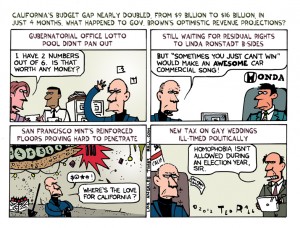The Jerusalem Post interviewed me about a controversial cartoon. (Not mine.)
SYNDICATED COLUMN: Satire – The Revolution Will Be Digitized
This Time: Three Douches To Watch Out For
It sounds like the lede of another breathless Dot-Com Bubble 3.0 puff piece by David Carr.
Three douchebags hook up at a café-cum-gallery-cum-hacketeria in a section of Brooklyn so hip that hipsters can’t find it on an app. Eight minutes later, they’ve banged out a business plan. What for, they can’t say. All they know is, it’ll be wicked awesome sweet. They send out a few emails; before you can type 140 characters they’ve lined up $28 million in seed capital. (There’s also out-of-school chatter about off-the-book rubles. Whatever.)
Now everyone’s talking about Douchenet.
Not you. You’re not talking about Douchenet. No one you know is talking about Douchenet.
By “everybody,” we don’t mean “everybody.” We don’t even mean “a large number of people.” We mean “everyone who matters.” Which most assuredly doesn’t include you. Or, really, hardly anyone at all.
So.
What exactly is Douchenet? Who knows? Who cares? The point of a piece like this one isn’t to tell you what’s going on. The point is to blow some free publicity the way of well-connected 26-year-old friends of people who matter to people who matter. (Not. You.) Twenty-six-year-olds whose business ideas are obviously utter horsecrap, are clearly doomed to failure, but not before they walk away with even more cash, raised from unwashed small-time rube wannabe playas. That’s the point of a piece like this.
That, and to make you feel miserable.
You poor, stupid, underemployed schmuck. A schmuck who will never, ever come anywhere near millions and millions of dollars. No matter how hard or long you toil.
Id.
iot.
At first (and OK, 17th) glance, last week’s Facebook IPO looks like a fiasco. Federal investigators are looking into charges that Morgan Stanley knowingly set the share price too high in order to inflate its underwriting fees, leaving unsophisticated stock buyers holding the bag for an 18 percent plunge of a $16 billion offering. But that’s only half the picture.
Sure, millions of people lost their hard-earned savings. But three douchebags are rocking out.
Which is what matters.
Mark Miron, 26, got paid in Facebook shares for watching Mark Zuckerberg’s cat one summer. As of last week, he was worth $200 million. But he’s more than just another smug, Silicon Valley wanker with rich parents, who likes to wear blue shirts with white collars, and is smart enough not to let his friend’s friend’s cat die. I mean, he is that. But there’s other stuff too. Like, he made a name for himself at Google when he agreed with some other entitled kids-of-Boomers that having illustrators design the search engine’s front page for free (i.e. “exposure”) was a cool idea. (By “cool,” we mean cheap, cynical and exploitative.) Can you say moxie?
Marc Parker, 26, started out at Facebook.co.uk, where he came up with the idea to model the British version of the site after its American parent, down to using the same language. “I love the blue hyperlinks. The white background. So American. And yet so British.” Eager to be promoted from a prat or a git to a full-fledged douchebag, Parker moved to Palo Alto, California in order to relinquish first his British, then his American citizenship in order to avoid paying taxes on the £200 million he earned from the IPO.
Jeff Mark, 26, drifted from PayPal to Facebook to MySpace to Compuserve to Netscape back to Compuserve. (Though closed, he somehow managed to collect €200 million from the latter.)
The three men became inseparable—and insufferable—after a chance encounter at Bi-Nary, a macrobiotic air bar that caters to sexually indiscriminate coders on the edge of the foothills near the section of the Google campus where they test attack drones for corporations.
It was during a sex tour of the Bushwick section of Brooklyn that the three douches conceived Douchenet. “We were talking about how, even though douches run just about everything in multimedia, until recently there weren’t the authoring tools and the bandwidth and/or the tablet platform for douches to hook up to do douchey things,” said Miron.
“Yeah,” agreed Parker and Mark.
I reached out to (that’s e-talk for “called”) Margot Jefferson, an analyst at D-Freak, a firm that tracks douchebaggery. “Douches account for 33 percent of start-ups, which account for 82 percent of investor fleecing, which amounts to 126 percent of economic activity in the United States,” points out Jefferson. “So the ability to connect douches across digital platforms using digital things is a game changer,” she confirms.
Given the power and the track record of these remarkable entrepreneurs, Douchenet is a story about power, wealth, journalism—and yes, wealth and power—worth watching. Marc Miron, for example, wrote that article that appeared in Wired that time. And Parker’s dad is just ridiculously rich, so we know he’s smart. Douchenet brings to mind Wingnutnet, a website you’ve never heard of because it doesn’t exist, yet which I’ve been writing about forever, by which I mean 2011.
Sometime this summer, Android will release a free version of Douchenet, so people who sign up can begin registering their personal financial information for distribution to trusted sites in Belarus. Using the so-called “freemium” model, Douchenet will charge fees for actual features, like the ability to create an “avatar” that could be sold by Farmville, which would pay a fraction of a fractile of a percent back to the original user, i.e. Douchenet.
In a live Tweetathon, Mark said he was drawn to Douchenet less by the idea than by the people who came up with it. “When you make an investment, you are betting on the team more than the idea,” he said. “If the idea is wrong, but the team is right, they will figure it out.”
“Who knows where this will end up?” he added between tokes on a clove bong.
(Ted Rall’s next book is “The Book of Obama: How We Went From Hope and Change to the Age of Revolt,” out May 29. His website is tedrall.com.)
Los Angeles Times Cartoon: The Other 80%
I draw cartoons for The Los Angeles Times about issues related to California and the Southland (metro Los Angeles).
This week: Up to 20% of the personal income growth in the state of California could be attributed to the initial public offering of stock by Facebook. So what’s the other 80%?
The Graphic Canon, Volume 1
A heads up for comics fans: Volume 1 of The Graphics Canon is out now. (I’m in Volume 3, not 1.)
They asked cartoonists to illustrate literary classics in their own styles.
Also worth noting, for New Yorkers, is the launch party tomorrow night at the Rubin Museum.
Reagan’s Blood For Sale
An auction house claims to be auctioning off a vial of Ronald Reagan’s blood.
Is it a vegetable?
I don’t understand why people are mad. Except I sure wouldn’t pay thousands of dollars for old ice.
Having a bad day? At least Reagan is still dead—so we’ve got that working for us.
A Hot Summer for the 1%
Today at 10:45 am Occupy the East End illegally foreclosed on the Bank of America branch in East Hampton NY.
1%ers are already flocking to the Hamptons, so we thought they needed a political wake up call. Politics don’t end just because you’re on vacation.
Here is the text of our statement, which we mic-checked inside the branch:
FORECLOSURE NOTICE
Under and by virtue of the inherent power of the 99% of the American people, we, the members of Occupy the East End, hereby notify the Bank of America branch at 14 Newtown Lane, in the village of East Hampton, in the State of New York, that we are hereby filing this notice of foreclosure and eviction.
We, the people of the East End of Long Island, New York, claim legal title to and ownership of this facility as of 11:00 AM on Saturday, the 19th day of May, 2012. Please vacate the premises immediately. Your personal possessions will be removed and sold at auction.
In addition, we demand that Bank of America cease and desist all pending actions related to eviction or foreclosure, regardless of cause.
We demand that Bank of America immediately return all evicted persons to their homes, plus compensate them for any and all losses caused by the Bank’s actions, plus interest at the highest rate charged by any credit card issued by the Bank.
In cases where new homeowners now reside in the homes of people displaced by the Bank’s illegal actions, we demand that the Bank of America provide a replacement home at, or above, the highest pre-2008 valued assessment of homes from which victims were evicted, or a cash payment in said amount, plus interest at the highest rate charged by any credit card issued by the Bank.
In June 2011 a customer at the Capitol One branch next to the Bank of America branch in East Hampton left behind an ATM receipt showing that he had a balance of $ 99,864,731.94. This customer is one of hundreds of multimillionaire 1%ers whose predatory behavior, in conjunction with the perfidy of the banks, have reduced our community and our nation to a state of permanent austerity and suffering. Bank of America has similar customers with similar balances. We therefore demand that Bank of America establish a fund in the amount of $100 million—the balance of one checking account—in order to serve the immediate needs of the hardest-hit residents of the East End of Long Island.
This eviction is predicated upon Bank of America’s default of basic civil responsibility and honest business practices, having been evidenced by, among other actions, engaging in the foreclosure and evictions of families with the goal of earning profits in the wake of a national financial crisis which was partly caused by the reckless dealings of said Bank, the greed and avarice of the Bank’s overpaid executives, who frequently resorted to “robo-signings,” and the filing of fraudulent Deeds of Trust in executing said illegal foreclosures and evictions, plus the secret and illegal extraction of at least $45 billion in public funds from the U.S. Treasury.
The greed continues. Your leader, Brian Moynihan, was ranked America’s second-worst bank CEO of 2011 by Fortune magazine, yet he paid himself an obscene $7 million the same year that he prepared to fire 30,000 employees. Meanwhile, your Bank imposed a monthly fee for people to use debit cards—cards originally issued in order to replace human tellers, whom you fired after years of loyal service at low wages. Brian Moynihan says: “We have a right to make a profit.” No, you don’t. Not when you’re breaking the law. Not when you’re evicting people from their homes illegally.
Bank of America and the other big banks illegally evicted four million American families since 2008. Bank of America was responsible for nearly half of these. But only 750,000 will get help under the new settlement—average payouts of $2000 each. You stole houses for $2000 each.
For example, in one instance, Bank of America/Countrywide caused to be filed a Notice of Default against a consumer who did not miss any payments justifying the issuance of any default notification whatsoever.
Additionally, thousands of consumers were allegedly told by Bank of America/Countrywide employees and/or agents that they will all have to “wait” in order to be allowed to modify their loans. Bank of America/Countrywide further represented to consumers that they would not be penalized for failing to make mortgage payments or any property-related payments, and indeed, told the consumers that it is beneficial for consumers to fall further behind in their payments because that will “make it easier” to modify the unreasonable adjustable loans. Instead, the moment that consumers fell three months or more in arrears (as ordered by the bank) the bank immediately began foreclosure proceedings by filing notice of defaults and backing consumers into a corner with zero options and at the mercy of the lender. These types of foreclosure practices are illegal and unethical and we demand that they stop immediately.We are Occupy the East End.
You should have expected us.
We will not be silenced.
For delivery to:
Brian T. Moynihan
President and CEO
Bank of America
We distributed this statement to customers and tellers, and demanded that it be faxed to Moynihan.
Meanwhile, a contingent outside help up an Occupied Bank of America banner.
Thanks for Trying!
Hi! Unfortunately, the campaign failed to make its goal. Still, thanks to the more than 100 people who supported it with significant pledges. I am honored by your faith in me. Obviously I will not be doing ths book. (Unless someone steps forward with a big check.) What next? There are several possibilities. No major publisher would pony up enough money for travel and research, but there are alternatives to Kickstarter that I will look into. Also, I’ll be working on more commercial projects that might attract major publisher backing. We’re still feeling out the post-mainstream media collapse. If the kind of independent journalism, art and punditry I do is to survive, it will require backing, either from digital publishers, or individuals. So far there is no sign that websites, even those with deep pockets, are going to step up–but perhaps that will change. Individuals are stretched. Wealthy patrons are a possibility, but where to find one? In any event, please follow me at rall.com and thanks again.
Kickstarter Project Doomed
Despite a lot of support—130 people promised $9435—my Kickstarter project is obviously going to be a bust. There are 50 hours to go, and the rate of pledges has simply seized up.
So what went wrong? It’s anybody’s guess. Among some of the conjectures I’ve heard are:
The economy is shitty. Kickstarter is oversaturated. Without being highlighted on the site’s front page, it languished. Certainly there was zero support from the blogosphere, which no doubt considered this idea too radical for them. My fans are tapped out by my auctions, computer fundraiser and previous (Afghanistan) Kickstarter.
Who knows.
This is bittersweet for me. It’s great to know that so many people are able and willing to help support what I do. My readers are the coolest, smartest, sanest people around. So generous, it’s amazing!
But I despair for the future. Political websites and leftie blogs have refused to hire cartoonists or writers, or pay outrageously low rates that are impossible to live on. Print media is firing, not hiring. The only thing left is direct support from the public—and if that doesn’t work, well…
now what?
Los Angeles Times Cartoon: The Budget Gap Explained
I draw cartoons for The Los Angeles Times about issues related to California and the Southland (metro Los Angeles).
This week: Gov. Jerry Brown’s proposal for closing California’s $16-billion funding gap includes 4-day state workweeks and Medi-Cal cuts. He warns that cuts will be even more severe if voters reject tax hikes on the November ballot.
Kickstarter Project Going Down In Flames
My Kickstarter book project is going down in flames.
With four days left, it is less than one-quarter funded. Please help spread the word!
It probably didn’t help that Kickstarter never ran the project on its front page.



